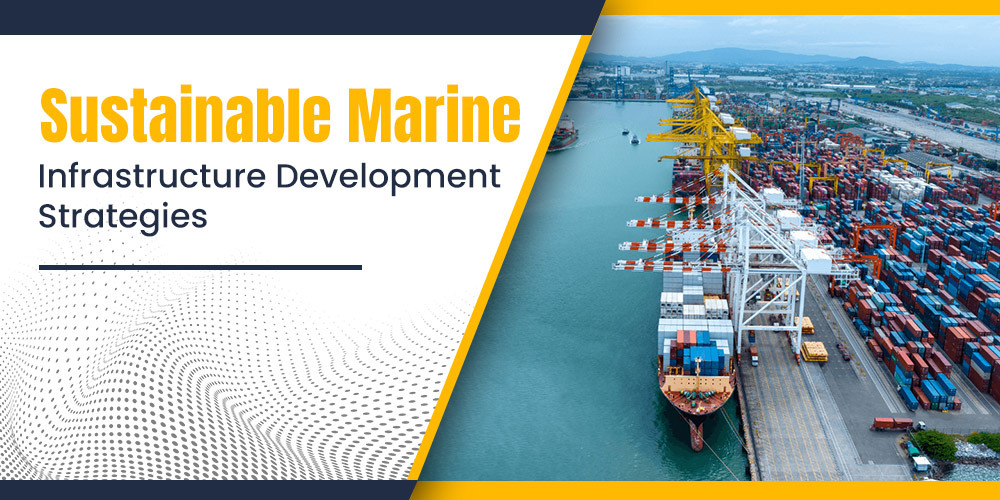Blogs

Sustainable Marine Infrastructure Development Strategies
Summary:
Sustainable Marine Infrastructure is reshaping the future of port development, environmental protection, and maritime logistics. With rising demands in regions like the UAE, Saudi Arabia, Qatar, Oman, Bahrain, Kuwait, and India, Marine Contractors for Port Authorities and Maritime Engineering Firms are focusing on innovative, sustainable solutions. This blog explores the global best practices, regional priorities, and the critical role of marine civil engineering contractors and maritime project management services in driving this transformation.
Table of Contents:
- Introduction
- Global Trends in Sustainable Marine Infrastructure
- What Are Sustainable Marine Infrastructure Strategies?
- Why Sustainability Matters in Marine Projects
- How Gulf Countries Are Leading the Shift
- Key Services and Stakeholders Involved
- Regional Highlights: UAE, KSA, Qatar, Oman, Bahrain, Kuwait, and India
- Global Comparison Table
- Final Thoughts
1. Introduction
With rapid industrialization and growing port activities across the Gulf and India, the demand for robust and environmentally conscious marine infrastructure has reached unprecedented levels. Sustainable development is no longer a choice but a necessity—driven by environmental regulations, climate change, and operational efficiency. Marine contractors for port authorities are now at the forefront, crafting long-term, resilient solutions that balance development with ecosystem preservation.
- Global Trends in Sustainable Marine Infrastructure
From Europe’s green ports initiative to Asia-Pacific’s tidal energy integration, sustainable marine infrastructure is evolving globally. Firms worldwide are integrating green materials, reducing dredging footprints, and incorporating digital project management.
- What Are Sustainable Marine Infrastructure Strategies?
Sustainable strategies involve eco-friendly dredging, modular quay walls, digital monitoring systems, and adaptive marine civil structures that protect marine ecosystems while enabling high-efficiency operations.
Key approaches include:
- Low-impact capital dredging
- Use of renewable energy at ports
- Smart marine construction materials
- Data-driven maritime project management services
- Why Sustainability Matters in Marine Projects
Sustainability Ensures:
- Long-term durability of structures
- Protection of marine biodiversity
- Compliance with international maritime and environmental regulations
- Enhanced value to stakeholders and investors
Marine engineering and construction firms are now tailoring solutions that meet these objectives without compromising commercial performance.
- How Gulf Countries Are Leading the Shift
Countries in the Gulf Cooperation Council (GCC)—especially UAE, Saudi Arabia, and Qatar—are prioritizing green marine infrastructure in their Vision 2030 goals. Their ports are being upgraded with smart technologies, sustainable breakwaters, and clean energy systems.
Top Regions Focus:
- UAE: Dubai, Abu Dhabi, Sharjah
- Saudi Arabia: Dammam, Jeddah, Jubail
- Qatar: Doha, Ras Laffan
- Oman: Sohar, Salalah
- Bahrain: Manama, Hidd
- Kuwait: Shuwaikh, Mina Al Ahmadi
These cities are key hotspots where Marine Civil Engineering Contractors play a critical role in transforming maritime infrastructure.
- Key Services and Stakeholders Involved
Here are the main entities involved in sustainable marine infrastructure development:
Stakeholder Type | Key Role |
Marine Contractors for Port Authorities | Execute sustainable construction at ports |
Marine Engineering and Construction Firms | Design and implement resilient marine systems |
Maritime Services for Ship Owners | Ensure port readiness for green ships |
Marine Civil Engineering Contractors | Deliver core structures with minimal environmental impact |
Maritime Project Management Services | Manage and monitor sustainable project lifecycles |
Marine Infrastructure Financing Firms | Fund and support eco-conscious maritime initiatives |
- Regional Highlights: UAE, KSA, Qatar, Oman, Bahrain, Kuwait, and India
The Gulf countries have embarked on large-scale port expansions and dredging projects, focusing on sustainability.
- UAE leads with digital port systems and solar-powered terminals.
- Saudi Arabia invests in mega coastal industrial cities powered by sustainable marine facilities.
- Qatar is focusing on LNG port expansion with minimal ecological disruption.
- Oman prioritizes eco-mooring and minimal-impact dredging.
- India is catching up with smart dredging and renewable-powered port terminals in cities like Mumbai and Visakhapatnam.
All these initiatives require collaboration with marine contractors for port authorities and dedicated maritime project management services.
- Global Comparison Table
Region | Focus Area | Innovations Used | Leading Firms Involved |
Europe | Eco Ports & Green Shipping | Tidal Energy, Eco Dredging | Boskalis, DEME |
Asia | Port Smartification & Sustainability | Digital Marine Twins, Solar Ports | Hyundai E&C, TOA |
Gulf | Green Port Infrastructure | Floating Jetties, AI Dredging Control | Rock & Reef, Van Oord |
India | Resilient Coastal Infrastructure | Low-impact dredging, Modular Sea Defenses | Rock & Reef Dredging Pvt. Ltd. |
9. Final Thoughts
Sustainable marine infrastructure is essential to the economic and environmental resilience of the Gulf and Indian maritime sectors. Companies like Rock & Reef Dredging Pvt. Ltd. are helping shape this future by offering advanced, eco-conscious marine engineering and construction services. If you’re seeking reliable marine contractors for port authorities or need assistance with marine infrastructure financing, we’re here to guide your journey. For specific project discussions, Please Contact Our Technical Support Team.

